|
News
|
|
|
Perspectives
|
|
|
Arts
|
|
|
Sports
|
|
|
Other
|
|

Royal City
At Rush Hour the Cars
by Jacob Kramer-Duffield
| Heard Here Rating: |
|---|



|
|
"Makes my heart beat fast. Got any speed?"
|
Toronto-based quartet Royal City are to music what Harold Reynolds was to baseball. They go about their work quietly, professionally and with grace. Never are they spectacular, nor do they disappoint in any way.
With this year's release At Rush Hour the Cars the band has gotten a well-deserved landslide of praise, particularly north of the border and in the northern parts of the States where their touring has thus far taken them. Their label, befitting such a low-key band, consists of them and two other bands, one of which is comprised entirely of Royal City members.

|
The album takes the form of a good walk, except it's music and not a walk, but it's still good. One could without qualms call it experimental, but that might give the wrong impression. Production centers on quality and not quantity, with the varied instrumentation defining a line rather than a wall of sound. Half a dozen different instruments or more are featured on nearly every track, but never is the sound crowded or contrived.
Simplicity is definitely the key, as some of the strongest tracks are those which are most uncluttered. "Codeine & Shakespeare," with only vocals, acoustic guitar and melodica, is a beautifully quiet meditation of a song (in addition to being one of the best song titles ever), and along with "I want to go everywhere with you" preceding it and "I'll never be" following it, forms a terrific close to the album.
Royal City might never make it big; in fact, they probably won't. That's probably fine with them. There seems to be a sort of bittersweet joy in their music-making, and the listener feels much the same sort of feeling when hearing At Rush Hour the Cars.
Copyright © 2000, The Oberlin Review.
Volume 128, Number 11, December 8, 2000
Contact us with your comments and suggestions.